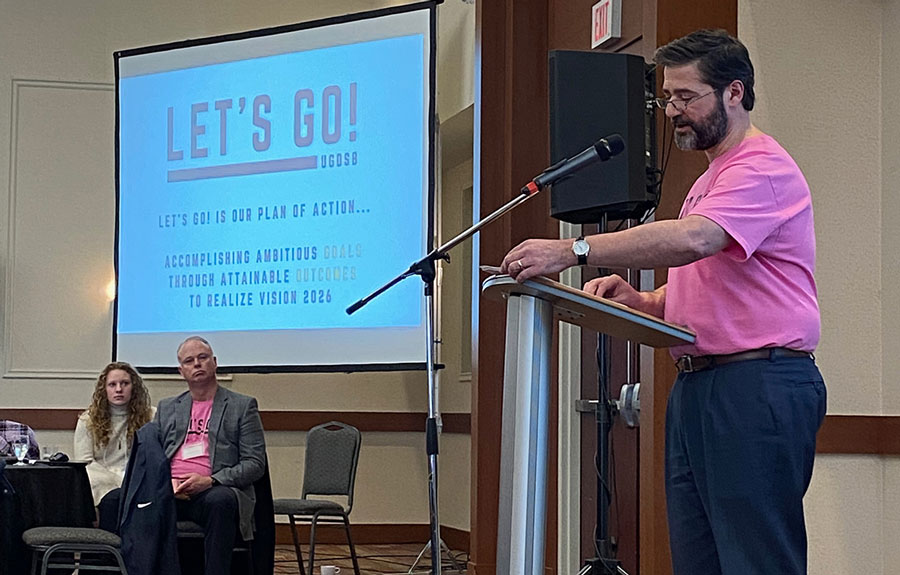GUELPH – Upper Grand District School Board (UGDSB) education director Peter Sovran said he is “continually in awe” of the efforts of UGDSB students and staff.
This awe is expressed in his annual report for the 2022-23 school year, which outlines progress towards “Vision 2026: To be recognized as leaders in creating unparalleled, agile and inclusive learning experiences for all.”
Transitions
Last year the UGDSB directed an “intense focus” towards student transitions between grades, the report states: “Throughout the year we had invigorating conversations and learning, and valuable visits to schools to get hands-on experience of how all schools support students in their different transitions and on their different paths.”
Early reading supports
The UGDSB hired 25 early reading teachers after the Ontario Human Rights Commission released its “Right to Read” report in February 2022.
The teachers gave reading instructions focused on phonics to struggling Grade 1 and 2 students.
“Students struggling with early reading skills as a result of disruptions to learning during the pandemic or due to learning difficulties benefitted significantly from the supports,” the report states.
“The early reading teachers also played an essential role in modelling instructional practices to early primary teachers.”
Empowerment Day
Students from Elora Public School organized and led an event to celebrate Empowerment Day on May 4.
About 5,000 students in Grades 5 to 8 gathered at the Sleeman Centre in Guelph to hear from “inspiring keynote speakers and their fellow peers about this year’s theme: ‘Why not now? Going Outside Your Comfort Zone.’”
Elora Public School teacher Andy Speers said, “We want students to challenge themselves to make a positive difference within their schools and communities, [and] reflect on their beliefs and ways … they can improve.”
Skills competition
The UGDSB’s annual Regional Skills Competition drew almost 1,000 Grade 4 to 8 students to compete in science, technology, engineering, mathematics and skilled trades categories.
Regional Skills Competition events included construction challenge; green energy; health and safety; TV and video production; Lego mechanics; Lego robotics; and Vex robotics.
“The competitions are a fun environment that allow students to problem solve, show their creativity and work together, while getting real world experiences,” the report states.
Innovation Lab
In February the UGDSB established a self-service studio called the “Innovation Lab” in Orangeville, where people can create video and audio learning modules and podcasts.
Users include visitors from the education and business sectors and it has become “an integral part of the program department’s daily operations, while also drawing attention from other departments,” Sovran states in his report.
“The Innovation Lab will continue to evolve to meet the learning needs of not only the UGDSB but other organizations looking to improve learning in their workforce.”
The report describes it as “a groundbreaking initiate that emerged in the wake of the pandemic, signalling a shift toward transformative learning practices.”
First Nations Métis math
Led by the UGDSB coordinating principal of Indigenous education Colinda Clyne, the First Nations Métis Math Voices Project integrates an Indigenous-focused lens to the math curriculum.
Clyne, who is from the Kitigan Zibi Anishinabeg nation, said, “We want people to see that there is math inherent in Indigenous technology and art.”
Students and educators examine math components including transformational geometry, proportional reasoning, measurement, ratio and spacial reasoning in Indigenous art such as hairpipe bracelets, loom beading, beaded medallions, beaded peyote stitch keychains, and finger weaving.
The project includes input from Anishinaabe and Métis leaders, artists and educators as well as non-Indigenous educators.
Incident reporting
The UGDSB implemented a new reporting system for incidents of identity-based harm.
“We all have an obligation to ensure that all acts of discrimination/oppression/slurs/harm are reported and acted upon in a timely manner,” Sovran states.
“All staff have a duty to report all incidents of identity-based harm to their supervisors immediately and fill out the identity-based harm reporting tool.”
The “Report Bullying” button on the UGDSB homepage and school websites was updated and is now the “Report Identity-Based Harm and/or Bullying” button.
Ventilation
All learning spaces, classrooms, and staff eating areas in the UGDSB continue to operate stand-alone HEPA filter units, and the board made further enhancements to school ventilation systems during the 2022-23 school year.
Heat pumps
The UGDSB began the installation of air source heat pump technology during the 2022-23 school year.
“Heat pump technology allows us to heat air using electricity instead of carbon sources,” the report states, and the board estimates an annual reduction of 60,000kg of carbon dioxide.
Staff well-being
The UGDSB wellness and employee health department offered 51 free four-week programs for staff, including: yoga, pilates, zumba, dance fit, bootcamps, mindfulness, meditation and nutrition.
More than 630 people participated in these programs.
Director’s annual report
Sovran said the report was “prepared under the leadership of communications manager Heather Loney,” and expressed “immense gratitude” towards her during an UGDSB meeting on Dec. 10.
“It is a very challenging task to collect information, stories, photographs – all sorts of artifacts over the course of a year and weave them together in a report,” he said.
To read the report visit ugdsb.ca.




